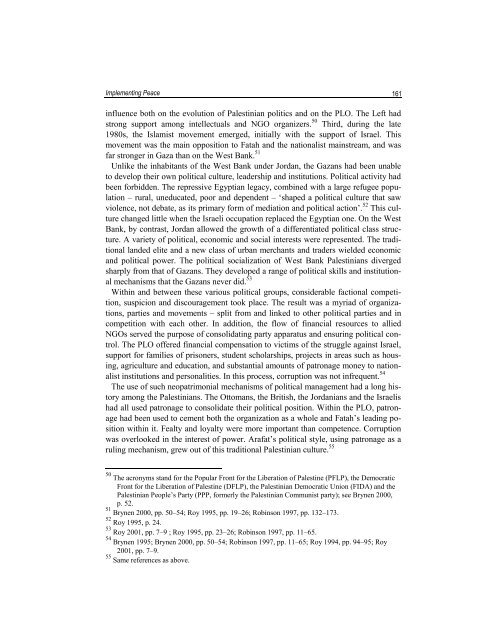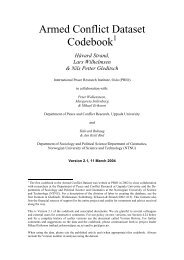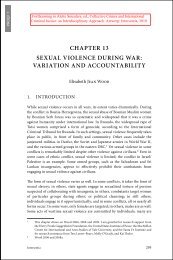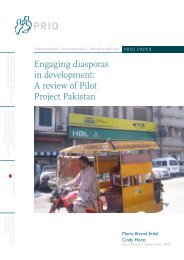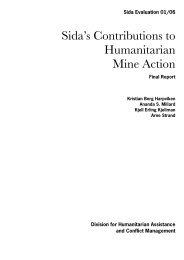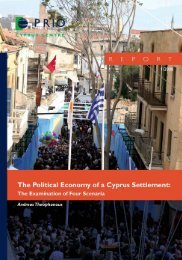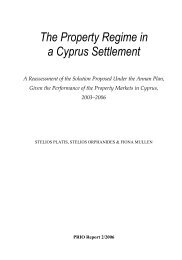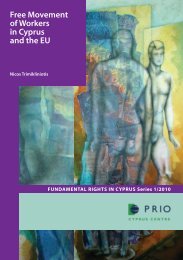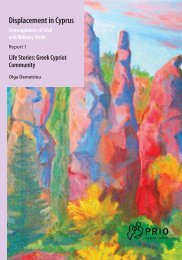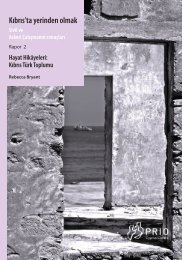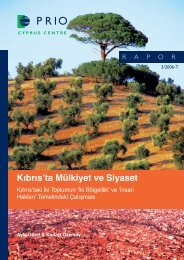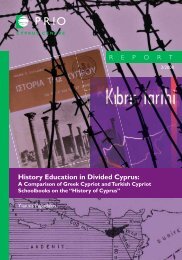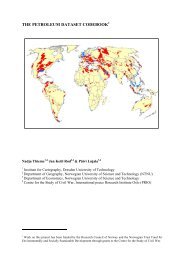Peacemaking Is a Risky Business - PRIO
Peacemaking Is a Risky Business - PRIO
Peacemaking Is a Risky Business - PRIO
Create successful ePaper yourself
Turn your PDF publications into a flip-book with our unique Google optimized e-Paper software.
Implementing Peace161influence both on the evolution of Palestinian politics and on the PLO. The Left hadstrong support among intellectuals and NGO organizers. 50 Third, during the late1980s, the <strong>Is</strong>lamist movement emerged, initially with the support of <strong>Is</strong>rael. Thismovement was the main opposition to Fatah and the nationalist mainstream, and wasfar stronger in Gaza than on the West Bank. 51Unlike the inhabitants of the West Bank under Jordan, the Gazans had been unableto develop their own political culture, leadership and institutions. Political activity hadbeen forbidden. The repressive Egyptian legacy, combined with a large refugee population– rural, uneducated, poor and dependent – ‘shaped a political culture that sawviolence, not debate, as its primary form of mediation and political action’. 52 This culturechanged little when the <strong>Is</strong>raeli occupation replaced the Egyptian one. On the WestBank, by contrast, Jordan allowed the growth of a differentiated political class structure.A variety of political, economic and social interests were represented. The traditionallanded elite and a new class of urban merchants and traders wielded economicand political power. The political socialization of West Bank Palestinians divergedsharply from that of Gazans. They developed a range of political skills and institutionalmechanisms that the Gazans never did. 53Within and between these various political groups, considerable factional competition,suspicion and discouragement took place. The result was a myriad of organizations,parties and movements – split from and linked to other political parties and incompetition with each other. In addition, the flow of financial resources to alliedNGOs served the purpose of consolidating party apparatus and ensuring political control.The PLO offered financial compensation to victims of the struggle against <strong>Is</strong>rael,support for families of prisoners, student scholarships, projects in areas such as housing,agriculture and education, and substantial amounts of patronage money to nationalistinstitutions and personalities. In this process, corruption was not infrequent. 54The use of such neopatrimonial mechanisms of political management had a long historyamong the Palestinians. The Ottomans, the British, the Jordanians and the <strong>Is</strong>raelishad all used patronage to consolidate their political position. Within the PLO, patronagehad been used to cement both the organization as a whole and Fatah’s leading positionwithin it. Fealty and loyalty were more important than competence. Corruptionwas overlooked in the interest of power. Arafat’s political style, using patronage as aruling mechanism, grew out of this traditional Palestinian culture. 5550 The acronyms stand for the Popular Front for the Liberation of Palestine (PFLP), the DemocraticFront for the Liberation of Palestine (DFLP), the Palestinian Democratic Union (FIDA) and thePalestinian People’s Party (PPP, formerly the Palestinian Communist party); see Brynen 2000,p. 52.51 Brynen 2000, pp. 50–54; Roy 1995, pp. 19–26; Robinson 1997, pp. 132–173.52 Roy 1995, p. 24.53 Roy 2001, pp. 7–9 ; Roy 1995, pp. 23–26; Robinson 1997, pp. 11–65.54 Brynen 1995; Brynen 2000, pp. 50–54; Robinson 1997, pp. 11–65; Roy 1994, pp. 94–95; Roy2001, pp. 7–9.55 Same references as above.


